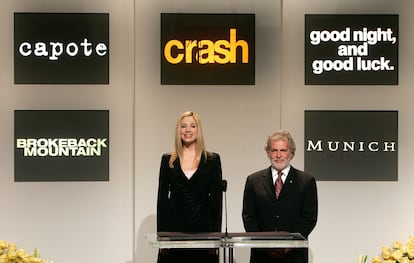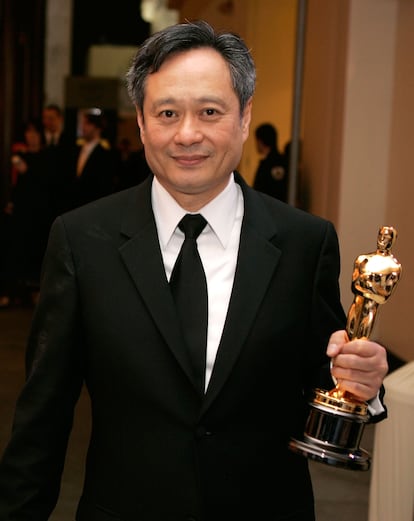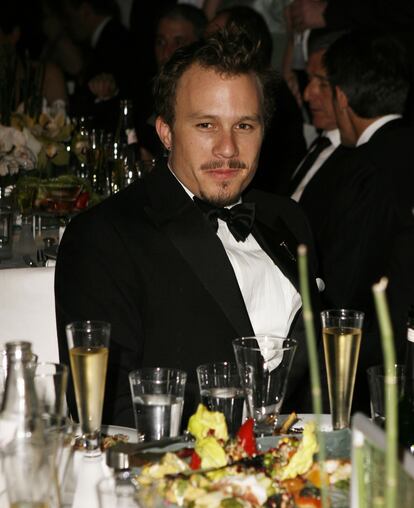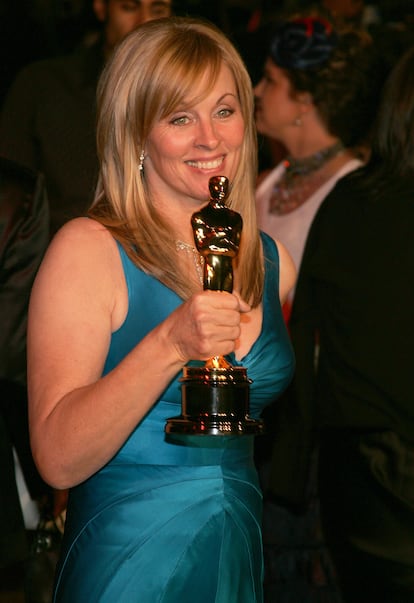Injustice before ‘Barbie’: When the Oscars’ ‘conservative heffalumps’ shunned ‘Brokeback Mountain’
The exclusion of Greta Gerwig and Margot Robbie from their presumed award categories has sparked accusations of sexism in the Academy — a controversy reminiscent of the scandal 18 years ago surrounding a celebrated film featuring two gay cowboys

Supposedly, no one really cares that much about the Oscars anymore: the films that win are increasingly irrelevant at the box office and the gala’s viewership is dwindling, dropping from 43.7 million in 2014 to less than 19 million last year. But this decline in relevance has not prevented the awards from being plagued by controversy. Immersed in our culture of immediacy, the drama no longer takes place during the ceremony, but after the nominations are announced. The exclusion of Greta Gerwig and Margot Robbie from the categories of best director and lead actress, respectively, for their roles in the hit film Barbie has prompted much criticism and commentary since the day the nominees were announced on March 10. Ryan Gosling, in a statement criticizing the nominations, quipped that “there is no Ken without Barbie,” and Hillary Clinton jumped on the bandwagon with her own viral tweet.
The news has also produced the opposite effect: critics who had previously kept their opinions to themselves are now speaking out in defense of the Academy’s decision — The New York Times published a commentary by Pamela Paul titled “Barbie Is Bad. There, I Said It.” — and pointing out that the decision was not the result of some orchestrated anti-feminist conspiracy on the part of the Kens of the Academy, but simply a matter of voter taste. Perhaps to refute the accusation of endemic machismo in Hollywood one need only look to last year’s awards, which saw Everything Everywhere All at Once, a film starring three physically and emotionally powerful women, win seven awards, including for Best Picture, or to the previous two years, when both Jane Campion and Chloé Zhao won Best Director. There was a time when sexism in the Academy was rampant, but that has changed in some respects — so much so, in fact, that today it is not even newsworthy to mention that LGBTQ-themed films are often nominated and take home awards in all categories. This year, for example, Maestro, Rustin, Nyad and The Color Purple are all hoping to win the little statue. Nor is it news that gay actors like Colman Domingo and Jodie Foster play gay characters.
But less than 20 years ago, it was hard for the Academy to accept a love story starring two men. It may be hard to believe that sexism would lose someone a nomination in 2024, but on March 5, 2006, a film did lose an Oscar because of homophobia.
Two men living together on a ranch
The inaudible “wow” on Jack Nicholson’s lips after uttering a word no one had expected — “Crash,” the title of Paul Haggins’ near-debut film about racial tensions in Los Angeles — reflected a widely shared feeling of disbelief. It was felt in homes and newsrooms, and among the audience at the Kodak Theater, where Brokeback Mountain’s victory had seemed certain. Even the cast of the winning film appeared to be in shock, the overflowing joy competing with gestures of disbelief. What had happened?
To explain it, you have to go back seven more years, to when Brokeback Mountain was still just a short story by Annie Proulx, published in The New Yorker, that screenwriter Diana Ossana then shared with fellow writer Larry McMurtry, who immediately loved it. They asked Proulx for permission to adapt the story into a film, and the writer agreed, though she said she didn’t understand how it could be made into a movie. The real difficulty was not so much in writing the script — which would give more space to the stories of the protagonists’ wives, Alma and Lureen, and their family environment — but in finding someone who would dare to make it. The first name to tap was obvious: Gus Van Sant. The leading exponent of queer cinema believed that the project would only make sense with two big stars at the helm, so he suggested some top choices. Josh Harnett was interested, but was already committed to The Black Dahlia, and Matt Damon turned it down too, arguing that after playing a gay role in The Talented Mr. Ripley and a cowboy role in All the Pretty Horses, his next project couldn’t be a gay cowboy.
Leonardo DiCaprio, Ryan Phillippe and Brad Pitt also declined, and Mark Wahlberg was especially explicit in rejecting the project: “It was very graphic, descriptive — the spitting on the hand, getting ready to do the thing...” Unable to convince these luminaries, Van Sant abandoned the project. Pedro Almodóvar was also approached, but the Spanish director thought the script was lacking in sex. Later, speaking about his 2023 short film Strange Way of Life, he would comment to The New York Times: In Brokeback Mountain, Jake Gyllenhaal’s character says to Heath Ledger’s character that they should go away and work on a ranch. Heath says, ‘What would two men do in the West, working on a ranch?’ In many ways, I feel my film gives an answer to that.”

It was Diana Ossana who thought of Ang Lee. In The Wedding Banquet (1993), the director had already navigated LGBTQ themes, and if he had managed to get American audiences to read subtitles with the series Tiger & Dragon (2005), he could surely meet any challenge. But Lee was already committed to Hulk (2003), so he turned down the project. He was so moved by the script, however, that after finishing his work with Marvel and discovering that the Brokeback Mountain was still in search of a director, he took up the project. All that was left was to find the main actors. Jake Gyllenhaal, who had always been interested in the story, offered his services to Lee, and it was Ossana’s own teenage daughter who suggested Heath Ledger, to play the laconic Ennis Del Mar.
Naomi Watts, Ledger’s girlfriend at the time, insisted that he accept the role — though if she had known that during filming Ledger would fall in love with his co-star, Michelle Williams, she might not have been so enthusiastic. When Lee first saw them together, he knew he had found his cowboys. The choice of their wives proved controversial: both Michelle Williams and Anne Hathaway were associated with younger audiences, one for Dawson’s Creek and the other for The Princess Diaries. The four leads — Ledger, Gyllenhaal, Williams and Hathaway — were in their early 20s, but were incredibly talented and had an unshakable faith in the project they had just embarked upon.
“Crash!”
There was a buzz in Hollywood. The “gay cowboy” movie provoked laughs (and some resentment) among older generations. In their eyes, it represented an attack on the Western — that sacrosanct genre in which the image of the American heterosexual man had been cemented, and which had rarely been challenged, and only under cover of sufficient subtext, as in the famous “comparing guns” scene in Howard Hawks’ Red River (1948).
The critics loved it, and in the theaters, nervous laughter turned to anguish as the story unfolded. With a budget of less than $15 million, the film grossed more than $170 million. The eight Oscar nominations only underpinned its success, and made it the star of the gala: for the first time, a film featuring a gay couple was up for an Oscar for Best Picture. Another story with a gay leading man, Capote, was competing alongside it. Good Night, and Good Luck, Munich and Crash completed the quintet.
Up to that point, the awards circuit had followed a predictable path: Brokeback Mountain swept the board, winning a Golden Lion at the Venice Film Festival, a Golden Globe, the Critics Choice Awards and the BAFTA, and the night before the Oscar ceremony, the film triumphed at the Independent Spirit Awards. It was the clear favorite, followed by Crash, which had been released months earlier and whose main attraction was Sandra Bullock and Brendan Fraser staring in atypical roles.
The evening started out well for Lee’s film: it won Best Original Score for Gustavo Santaolalla’s delicate soundtrack, and Ossana and McMurtry won Best Adapted Screenplay. But Best Film Editing went to Crash, raising more than a few eyebrows, and neither Ledger nor Gyllenhaal took Best Actor — but that year they had some stiff competition: Philip Seymour Hoffman had transformed himself into Truman Capote and the Academy was not going to ignore George Clooney’s effort to look good in Syriana. Ang Lee took Best Director, as expected, and was standing in the wings waiting to join the final party when one word from Jack Nicholson changed everything.

While the large cast of Crash was celebrating, one could glimpse the disgruntled looks on the faces of the Brokeback Mountain team. The dream had vanished: that brave little film had been one step away from making history. “Surprise” was the most repeated word in the coverage of the gala. An angry Annie Proulx wrote an open letter in The Guardian titled “Blood on the red carpet” in which she did not spare any insult. She called the Academy voters “conservative heffalumps” and the crowd “somewhat dim,” and referred to Crash as “Trash.” She accused the Academy of being homophobic and suggested that the Church of Scientology, of which Paul Haggins was at the time a member, had something to do with the decision.
Proulx felt that the Academy had missed the message: for her, it was imperative that people understand that the film was not a love story, but a story of homophobia and intolerance. Ang Lee’s film is a film about the opposite of love, and its ending leaves little space for hope. Crash, however, spoke of redemption on the streets of Los Angeles, a landscape much more recognizable than the snowy peaks of Wyoming. It was also a film that actors liked: it had won the Screen Actors Guild Award, and actors are the largest group in the Academy. Moreover, it offered unusual diversity long before the #OscarsSoWhite would make the Academy’s lack thereof its rallying cry.
Perhaps more voters simply found it easy to identify with the helplessness of the character played by Thandie Newton, or with the Persian family trying to thrive in a hostile environment, than with a couple of attractive white guys tending sheep. Crash appealed to the diversity that forms the cultural fabric the United States, and it was the only major award nominee to do so. And there were two stories that year that told LGBTQ-themed stories — Brokeback Mountain and Capote — which may have split the vote.

It is undeniable, however, that homophobia was a determining factor. China banned the film’s screening and some theaters in the United States also refused to show it. In addition, actors such as Tony Curtis and Ernest Borgnine openly censored it. “If John Wayne were alive, he’d be rolling over in his grave!” the star of Marty complained. Screenwriter Diana Ossana confessed that she knew they were out of the running when a couple of weeks before the gala she discovered that her idol, Academy member Clint Eastwood, hadn’t even seen it.
And that was the key: many members of the Academy did not even want to watch the film, much less vote for it. Meanwhile, Oprah Winfrey had hosted the Crash team on the set of the most watched show on television, recounting how she had experienced racism as humiliating as the incidents depicted in the film.
The fact that we can easily assess why Brokeback Mountain didn’t win does not mean the decision was not a glaring example of the kind of mistakes the Academy would make two decades later. Ten years after the film’s release, The Hollywood Reporter polled hundreds of Academy members to find out what they would have voted for at the time, and Brokeback Mountain beat out Crash, which came in last in its category. Even the film’s own director, Paul Haggis, acknowledged that he would not have selected his film if he had been in a position to vote. “Was it the best film of the year? I don’t think so,” he said.
It would take 12 years for Moonlight to finally be the first film starring gay men to win the top category at the Oscars. Since then, times have changed so much that today, it’s more surprising that, in a film as supposedly progressive as Barbie, sexual diversity is thematized only in its subtext. Something along the lines of John Ireland and Montgomery Clift “comparing guns” in Red River.
Sign up for our weekly newsletter to get more English-language news coverage from EL PAÍS USA Edition
Tu suscripción se está usando en otro dispositivo
¿Quieres añadir otro usuario a tu suscripción?
Si continúas leyendo en este dispositivo, no se podrá leer en el otro.
FlechaTu suscripción se está usando en otro dispositivo y solo puedes acceder a EL PAÍS desde un dispositivo a la vez.
Si quieres compartir tu cuenta, cambia tu suscripción a la modalidad Premium, así podrás añadir otro usuario. Cada uno accederá con su propia cuenta de email, lo que os permitirá personalizar vuestra experiencia en EL PAÍS.
¿Tienes una suscripción de empresa? Accede aquí para contratar más cuentas.
En el caso de no saber quién está usando tu cuenta, te recomendamos cambiar tu contraseña aquí.
Si decides continuar compartiendo tu cuenta, este mensaje se mostrará en tu dispositivo y en el de la otra persona que está usando tu cuenta de forma indefinida, afectando a tu experiencia de lectura. Puedes consultar aquí los términos y condiciones de la suscripción digital.









































